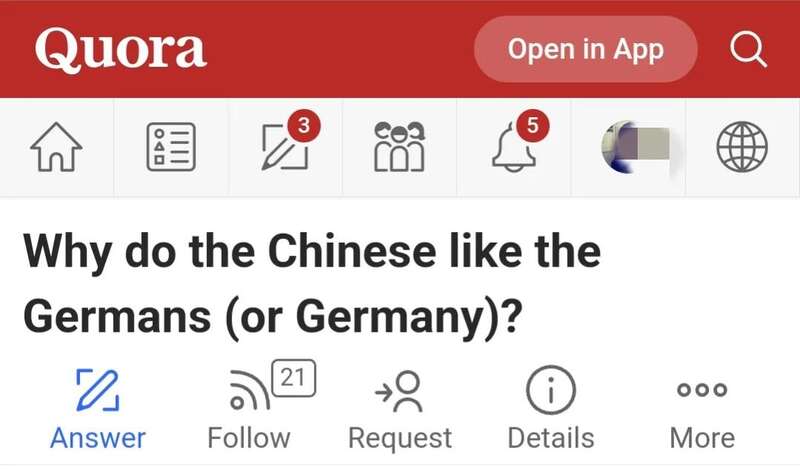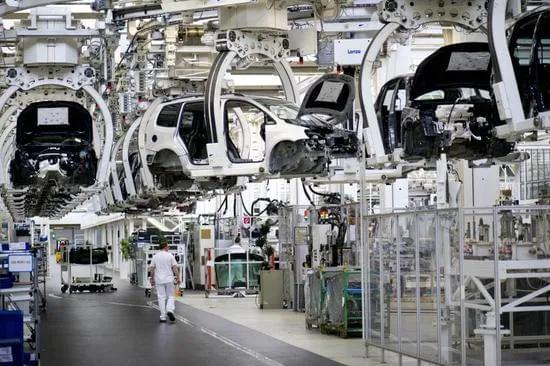 问题
问题
德国网友丹•汉克的回答
German culture shows the qualities that Chinese people can relate to or aspire to become. The most important is the culture of "turning work into love". Ironically, German and modern Chinese cultures are very, very different.
德国文化展现了中国人可以与之相关或渴望成为的品质,其中最重要的是,“让工作变成热爱”的文化。具有讽刺意味的是,德国和现代中国文化非常非常不同。
In addition to Germany's brief occupation of the Jiaozhou Peninsula (Jiaozhou), which produced China's Tsingtao Beer, compared with other imperialist countries, China has not suffered so much under German rule. Although China and Germany were both formal enemies in the two world wars, they never fought. In fact, until the end of the 1930s, when they were forced to make a choice between Japan and China, there was basically no opposition between them.
德国除了短暂侵占胶州半岛(膠州) — 这产生了中国青岛啤酒——与其他帝国主义国家相比,中国在德国人统治下并未遭受过如此多的苦难。尽管中国和德国在两次世界大战中都是正式的敌人,但他们从未交战过,事实上,直到1930年代末被迫在日本和中国之间做出选择之前,他们基本上并无对立。

Finally, the Chinese people all over the world unanimously respected Germany's conciliatory attitude and actions towards World War II and the Holocaust, and criticized right-wing Japanese for their statements and actions of denying historical crimes.
最后,全世界的中国人一致尊重德国对二战和大屠杀的和解态度和行动,并以此批评右翼日本人否认历史罪行的言论和行为。
As for why Chinese people are eager to join the ranks of FIFA in 2014: but there is no Chinese team, and the German football team is exactly what the Chinese people hope their team can become - a solid technical high-performance team. Besides, who doesn't like to cheer for winners who deserve to win?
至于为什么中国人会渴望加入2014年国际足联的行列:但里边没有中国队,而德国足球队正是中国人希望自己的球队能够成为的——一支坚实的技术高性能球队。此外,谁不喜欢为值得获胜的胜利者欢呼呢?

海外网友凯文•伦道夫的回答
From my experience in daily life and extensive browsing of Chinese media, the Chinese people really have a positive impression of Germany. This is because:
从我在日常生活和广泛浏览中国媒体的经验来看,中国人确实对德国有着积极的印象。这是因为:
First of all, historical reasons, as the last respondent, Gab Chan, said in his answer:
• Germany and China have never fought directly alone. The concession in Jiaozhou Bay occupied by Germany in modern China is a shameful memory for the Chinese, but it is not as cruel and hateful as the Japanese invasion and colonization.
•德国和中国从未单独直接交战。德国在近代中国侵占的胶州湾租界对中国人来说是可耻记忆,但不像日本侵略和殖民那样残忍与可恨。

• Germany sincerely apologized for its atrocities in the Second World War, such as Warshol Kneifel, which left a deep impression and touch on the Chinese people. The Japanese Prime Minister and others still visit the Yasukuni Shrine every year, including 2014 (1068 war criminals are listed; 14 of them are considered Class A), and deny some of the facts of aggression in Japanese history textbooks. Most Chinese hope that the Japanese government can stop all these acts and show the same attitude of apology as Germany.
•德国对其在第二次世界大战中的暴行表示了真诚的道歉,例如沃肖尔·克尼费尔,这给中国人民留下了深刻的印象和感动。包括2014年在内,日本首相和其他人每年仍在参拜靖国神社(其中列有1068名战犯;其中14人被视为A级),并否认日本历史教科书中的部分侵略真相,大多数中国人希望日本政府能停止所有这些行为,并表现出与德国一样的道歉态度。
• The German people have made contributions to China, such as John Rabe, who initiated the establishment of the Nanjing Security Zone during the Nanjing Massacre, and served as the chairman of the International Committee for the Security Zone. He protested regardless of danger and did his best to prevent the Japanese aggressors from committing violence against the Chinese people. The security zone provides temporary shelter for about 250000 Chinese civilians. Don't forget Karl Marx and Engels. Marxism is an important origin of communist theory.
•德国人民对中国有过贡献,如约翰·拉贝,南京大屠杀期间发起建立南京安全区,并担任安全区国际委员会主席,不顾危险、奋不顾身地抗议和尽其所能地阻止侵华日军对中国人民施暴。安全区为大约25万中国平民提供了暂时栖身避难的场所。别忘了卡尔·马克思和恩格斯,马克思主义是共产主义理论的重要起源。

Second, Germany is a model of economic development in the eyes of the Chinese. Germany was also seriously destroyed by the war, but the German people rebuilt their homes, achieved great success in industrial and economic development, and regained the status of a powerful country.
其次,德国是中国人眼中的经济发展典范。德国也被战争严重摧毁,但德国人民重建了家园,在工业和经济发展方面取得了巨大成功,重新夺回了强大国家的地位。
Third, Germany is a model of science, technology and machinery industry. The fact that Germany has made great contributions to modern science and technology is well known in China. Chinese people, like many people in other parts of the world, believe in the famous brand "Made in Germany". German brands rank first in China's automobile market share. Most Chinese believe that "owning BBA (Mercedes Benz, BMW, Audi) cars" is a symbol of success and wealth.
第三,德国是科学、技术和机械工业的典范。德国对现代科学技术做出巨大贡献的事实在中国是众所周知的,中国人和世界其他地方的许多人一样,相信“德国制造”这一著名品牌。德国品牌在中国汽车市场占有率排名第一,大多数中国人认为“拥有BBA(奔驰、宝马、奥迪)汽车”是成功和财富的象征。

• The Chinese believe that Germany's technology in advanced machinery, such as R&D and engine manufacturing, is at least 20 years ahead of the world. Although China is catching up, there is still a gap. The quality of products made in Germany has also been widely recognized. On China's SNS, some videos and articles compare "Made in Germany" and "Made in China" products, almost worship "Made in Germany", and always end with the question "What can we learn from Germany", and people will actively forward.
•中国人认为,德国在先进机械方面的技术,如研发和制造发动机,至少领先世界20年,尽管中国正在追赶,但还是有一定差距。德国制造的产品质量也得到了广泛认可。在中国的SNS上,一些视频和文章在比较“德国制造”和“中国制造”的产品,几乎崇拜“德国制造的”,总是以“我们能从德国学到什么”的问题结束,人们会积极转发。
• The Chinese media once widely reported a report on Germany, which was later confirmed to be a rumor: in Qingdao (occupied by Germany), the Germans built a drainage system that can still be used even after 100 years. One day, some failures occurred, and the Chinese workers were unable to solve the problem. So they called the German company that built it. The German told them that "this drainage system is made by the German, so there must be some spare parts wrapped in oil paper when digging around the failure area". The Chinese workers really found some "spare parts wrapped in oil paper" to solve the problem.
•中国媒体曾广泛报道过一则关于德国的报道,后来证实是谣言:在青岛(德国侵占),德国人修建了排水系统,即使在100年后仍能使用。有一天,发生了一些故障,中国工人无法解决问题,于是他们打电话给建造它的德国公司,德国人告诉他们“这个排水系统是德国人制造的,所以在故障区域周围挖掘,一定有一些用油纸包裹的备件”,中国工人真的找到了一些“用油纸包的备件”这样解决了问题。
But the fact is that the drainage system is made of concrete, so there is no "part". It was completely renovated long before the false report, and the German company was dissolved long before the false report. Many Chinese who have not seen the clarification still believe in this legend.
可事实是,排水系统是由混凝土制成的,因此没有“零件”,早在虚假报道之前就彻底翻新了,而这家德国公司早在虚假报告之前就被解散了。许多没有看到澄清的中国人仍然相信这个传奇故事。
Fourth, Germany is a model of environmental protection. Similarly, on Chinese media and SNS Weibo, some videos and articles end with "What can we learn from Germany", pointing out how Germans live a green life. The Chinese will actively forward it.
第四,德国是环境保护的典范。同样,在中国媒体和SNS微博上,一些视频和文章以“我们可以从德国学到什么”为结尾,指出德国人如何过绿色生活。中国人会积极转发。

Fifth, Germany is strong in football, while China's national football team is weak. Different from the Americans, the Chinese people are very concerned about football matches and always hope that the Chinese football team can achieve some results, but the results are disappointing. They have dedicated their enthusiasm to the German team that continues to win. I don't think the news report in question is exaggerated. During the 2014 World Cup, the German team received the most support on China's SNS "microblog" (Chinese Twitter).
第五,德国在足球方面很强,而中国国家足球队却很弱。与美国人不同,中国人非常关注足球赛事,总是希望中国足球队能取得一些成绩,但结果却大失所望,他们把自己的热情献给了不断获胜的德国队。我认为问题中的新闻报道并不夸张。2014年世界杯期间,德国队在中国SNS“微博”(中文推特)上获得了最多的支持。
Sixth, positive stereotypes of Germans. If you ask some Chinese people what their impression of you is, most people will surely tell you that "rigorous" means responsible, reliable and strict. Other images of Germans in the eyes of Chinese people: punctuality, diligence and intelligence. Another widespread rumor in Chinese media and SNS is: "In Germany, trains will never be delayed".
第六,对德国人的积极刻板印象。如果你问一些中国人,德国人对你的印象是什么,大多数人肯定会告诉你,“严谨”,严谨,意思是负责,可靠,严格。德国人在中国人心目中的其他形象:守时、勤奋、聪明。中国媒体和SNS上的另一个广泛传言是:“在德国,火车永远不会延误”。
In addition, according to a survey by the BBC, Germany is favored by many countries:
此外,根据英国广播公司(BBC)的一项调查,德国受到许多国家的青睐:

Historically, compared with other western countries, China's relations with Germany are relatively cooperative and harmonious.
历史上,和其他西方国家相比,中国与德国的关系是相对合作和和谐的。
Yes, I know Qingdao. My hometown is Qingdao. Thanks to a father who loves reading, I know a lot about Qingdao's history. Germany has an ugly colonial history in Qingdao, but walking around the old city of Qingdao, you can also see the exotic customs left by the colonists, which has promoted the internationalization of Qingdao to a certain extent.
是的,我知道青岛。我的家乡是青岛,多亏了一个爱读书的爸爸,我知道了很多青岛历史。德国在青岛有着丑陋的殖民历史,但漫步青岛老城区,你也可以看到殖民者留下的异域风情,一定程度上提升了青岛的国际化。
Different from the way the Japanese treat Qingdao, the Germans went to Qingdao and built it into their own style. Ironically, of course, this is a colony that you really took away from China. Many of Qingdao's landmark buildings, old factories and historic sites have German roots. My father almost cried when he demolished the old railway station built by the Germans in Qingdao around 2000. According to him, the design and construction of this railway station are so iconic that the Germans even sent their own people to guide the demolition.
与日本人对待青岛的方式不同,德国人去了青岛,把它建造成了自己的样子。讽刺的是,当然,这是一块你真的从中国手里拿走的殖民地,青岛的许多标志性建筑、老工厂和名胜古迹都有德国的渊源。我父亲在2000年左右拆除了德国人在青岛建造的老火车站时几乎哭了。据他说,这座火车站的设计和建造方式都是如此具有标志性,德国人甚至派了自己的人来指导拆除。
At the end of the 1980s, they removed the lens of the famous Citingtao lighthouse for maintenance. At that time, it was still working like a brand new one.
在80年代末,他们拆除了著名的茨廷陶灯塔镜头进行维护,当时它仍然像是全新的一样工作。
I think this is also because Germany did not confront China directly in the two world wars. They occupied Qingdao by treaty and provided security for Qingdao for the benefit of the German Empire for a long time.
我想这也是因为德国在两次世界大战中都没有与中国直接对抗。他们通过条约侵占了青岛,并在很长一段时间内为了德意志帝国的利益给青岛提供了安全保障。
Some older locals (including my grandmother) prefer Germans to Japanese. According to them, Germans basically ignore the local people. They have their own elite residential areas, and the Chinese have their own elite areas. They do not interfere with the Chinese at the cultural level. When the Japanese invaded here, they forced the children to learn Japanese. The Chinese had to bow to the Japanese in the street and so on.
一些年长的当地人(包括我奶奶)比起日本人更喜欢德国人。根据他们的说法,德国人基本上不理睬当地人,他们有自己的精英居住区,中国人有他们的精英区,他们没有在文化层面上干涉中国人。当日本侵占这里时,他们强迫孩子们学习日语,中国人必须在街上向日本人鞠躬等等。
I know I'm just talking about the German people in Qingdao, but from a broader perspective, Germany has never really had a positive and hostile relationship with China, so I mention such a history here.
我知道我只是在谈论青岛的德国人,但从更大的范围来看,德国从未真正与中国有过正面的敌对关系,所以我在这里提及这样一段历史。

德国网友安娜•塞德尔的回答
I believe that in China and Japan, Germany's efficiency, high-quality products, cleanliness, punctuality and discipline have been universally appreciated by the world.
我认为,在中国和日本,德国的效率、高质量的产品、清洁、守时和纪律受到了世界普遍的赞赏。
Japan likes to regard itself as the Asian version of Germany (this is controversial... but the punctuality part is true. The biggest difference is that the Germans are outspoken, while the Japanese are prevaricating. In this case, they are diametrically opposite. But both Germans and Japanese are famous for punctuality, cleanliness and self-discipline)
日本喜欢将自己视为亚洲版的德国(这一点很有争议……但守时的部分是真的。最大的区别是,德国人直言不讳,而日本人则支支吾吾。在这种情况下,他们截然相反。但德国人和日本人都以守时、干净和自律著称)
Compared with Japan, China prefers Germany because Germany is more remorseful about its World War II crimes. China also likes BMW, Mercedes Benz and other German products. German sausages and beer are increasingly recognized.
与日本相比,中国更喜欢德国,因为德国对自己的二战罪行更加懊悔。中国也喜欢宝马、奔驰和其他德国产品。德国香肠和啤酒越来越受到认可。

However, Chinese and German cultures are almost diametrically opposed. Germany is dull and abides by tradition, while in China, the situation is different... Germany is free in philosophy, but strict in daily life. China is strict in philosophy, but more easy-going in daily life. Chinese people like crowds and excitement, while Germans like privacy and solitude, and get along quietly with close friends. The Chinese are outspoken about money and weight, while the Germans are very secretive about it. Germans often speak out and correct others, while Chinese people are unwilling to do so.
然而,中德文化几乎截然相反。德国是木讷、遵守传统的,而在中国,情况各不相同…德国在哲学上是自由的,但在日常生活中却是严格的,中国在哲学上是严格的,但在日常生活中更随和。中国人喜欢人群和热闹,德国人喜欢隐私和独处,与亲密的朋友安静地相处。中国人对金钱和体重直言不讳,而德国人则对此讳莫如深。德国人经常直言不讳地纠正别人,中国人则不愿意这样做。
Yes, these are stereotypes. Obviously, some Germans and Chinese will break this pattern. But culture is almost the opposite, haha. It is also true that these German qualities are appreciated by many Chinese.
是的,这些都是刻板印象。显然,一些德国人和中国人会打破这种模式。但是文化几乎是截然相反的,哈哈。也正是如此,德国这些品质为许多中国人所欣赏。
In recent years, I have often visited Germany and studied their social structure.
近年来我经常光顾德国,还研究了一下他们的社会结构。
You see, generally speaking, Germans are logical people. They like rational behavior patterns just like Chinese people. The results displayed in China, such as reforestation, providing people with a better life, investment and trade, and peaceful coexistence, were accepted by the Germans, but ran counter to the American narrative.
你看,一般来说,德国人都是有逻辑的人,他们像中国人一样喜欢合理化的行为模式。在中国所展示的结果,如重新造林、为人民提供更好的生活、投资和贸易、和平共处等,为德国人所接受,但与美国人的叙述背道而驰。
Therefore, it is natural for Germany and China to establish a strong relationship. Any rational person will coexist with each other for the common interest, right?
因此,德国与中国建立牢固的关系是理所当然的,任何理性的人都会为了共同利益而彼此共存,不是吗?
On the contrary, many Americans believe in various cults, extremism and nationalism at all costs; He made the world believe in their media, which would create false stories; zero-sum game; Americans are the best, they should lead the world, and there are many other nonsense.
相反,许多美国人信奉各种邪教和极端主义,不惜一切代价的民族主义;他让世界相信他们的媒体,而这些媒体又会制造虚假的故事;零和博弈;美国人是最棒的,他们应该领导世界,还有其他许多无稽之谈。

